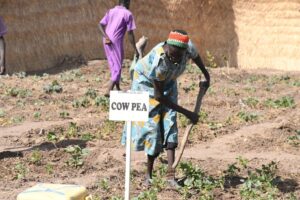By William Madouk
Peter Nyang, a primary eight pupil at Maluil Akong Primary School, overcame hardship by adopting the Home-Grown School garden concept and establishing his own flourishing garden at home.
Before the initiative, Nyang’s life was marked by hardship as he and his parents struggled to secure school fees, uniforms, and even a basic daily meal.
According to Nyang, prior to learning farming skills, he could just remain at home idly but when the World Food Programme introduced the Home-Grown School garden, he learned the techniques and was given seeds.
“Before the home-grown school garden was introduced, life was really very hard for us, and we also had no knowledge of how to cultivate or farm,” he said.
In his garden, Nyang planted okra, pumpkin, risotto, and onion, among other vegetables.
“I do benefit from this small garden a lot because when vegetables ripen, I go and sell some in the market to buy uniforms, and also for our house, my mother could come and pick from my garden,” he narrated.
“I do go to the home-grown school garden and see how they are doing their job; I then copy it and replicate it here in my garden,” added Nyang.
“I even bought this uniform that I am wearing after selling some vegetables. The money I earn depends on my productivity; sometimes I could get like SSP 2,000 or more, and I will save it until it reaches a certain amount of money I want,” he explained.
“We got the planting knowledge, but we were having a challenge with seeds because we have nothing, but we do plant in our school garden with our parents, and I take the few seeds that remain for our own farm,” he narrated.
Nyang decried the lack of seed; otherwise, he would have expanded his garden. He also promised to exchange the farming knowledge he obtained to teach his fellow students.

Albino Ajith Deng, a commodity tracking officer working for Welt Hungerhilfe (WHH), which partners with WFP, said they are now feeding about 475 students at Maluil Akong Primary School.
“There is a new initiative that has been introduced, for instance, the home-grown vegetables, at the beginning of this year, and it’s going well,” said Deng.
“This initiative has trained most of the students, and they have imitated it to household size, and they are now implementing gardening in their own houses,” he added.
Mr. Deng stressed that the school feeding programme has increased attendance and improved nutrition as pupils eat a balanced diet.
However, he cited that watering the garden during the dry season is very challenging because the only water point used by the community is a bit distanced. Pests that affect vegetables are some of the challenges.
One of the pupils, William Wol, 17, who is also a member of the school agriculture club, cited that he always informs his colleagues to water the garden and clear the weeds during break or leisure time.
“The good part of this garden is that we get different types of vegetables that will later be used for our feeding, and as you can see, we are having delicious and balanced diet meals,” said Wol, who also owns a garden at home.
Wol added that when he harvests Sukuma-wiki and sells it, he could earn SSP 5,000 to 6,000.
Another student, Abuk Akoon, stated that, “what I have learned here, I can now practice at house level, and if I get seeds, I will make my own garden that will help me in the future.”
Gabriel Deng Lual, the deputy headmaster of Maluil Primary School, attested that the initiation of the school feeding programme has increased the number of students and improved the pupils’ performances.
“The introduction of school feeding increases admission and keeps attendance intact; the number of boys now is 409 and the number of girls is 433—bringing it to a total of 842 students, and they still come because the feeding programme motivates them,” said Lual.
“Before the introduction of school feeding, the situation was very bad because students were unserious and not committed to their studies,” he added.
Ustaz Lual assured to work hard to ensure that the school gardening project continues even if the organizations pull out their funding.

Mr. Zakayo Deng Majok, a member of the Parents and Teachers Association (PTA), said they started the cultivation two years ago.
“This school garden initiative will not stop in this school so that our children concentrate on learning,” said Majok.
Whereas, Makena Walker, the acting country director of the WFP, accentuated the importance of the homegrown school feeding programme.
She stressed that the homegrown school feeding programme not only provides high-quality and nutritious meals for the students but also enhances their learning outcomes and overall health.
“In comparison to last year and previous meals served at the school, which mainly consisted of sorghum and beans prepared by the school committee with salt and oil provided by WFP, this year’s school meals are significantly different,” said Makena.
“Now, the students enjoy a diverse menu, including greens, cowpeas, and dry fish. We are truly grateful for this variety,” she added.
Besides, Governor Tong Akeen Ngor said the school feeding programme has a positive impact but decried a sharp reduction, which would have a negative impact.
“I appreciate WFP for the school feeding programme, which has a positive impact on the enrolment and retention of schoolchildren,” said Ngor.
“But with the current sharp deduction of funds, many children have dropped out of school because of hunger,” he added.
According to Ngor, WFP previously scaled up homegrown school feeding in Aweil, targeting 44 out of 144 schools, adding that the WFP must double up their efforts to cover more schools.
Meanwhile, the national minister of general education, Awut Deng Acuil, said, “We will continue to work closely to make this new homegrown school feeding programme.”
The upbeat minister added that ‘homegrown school feeding programmes are not only beneficial to the education sector but also improve the health and nutritional status of kids.”
She added that the initiative revitalized the local economy and markets, enhanced support for farmers and agriculture, and addressed hunger faced by young farmers.




